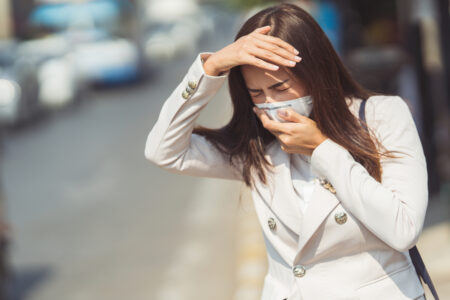
Clinical Trial Identifies Potential Treatment for Asthma in Latino Children
Clinical trials can help researchers learn to better treat asthma – but they need diverse volunteers.
Black and Latino children who have severe asthma, are prone to asthma attacks, and live in low-income urban neighborhoods are underrepresented in asthma treatment clinical trials, even though they are more likely than whites to face health inequities that can exacerbate asthma symptoms.
Fortunately, a recent National Institutes of Health (NIH)-funded clinical trial with mostly Black and Latino children found that a monoclonal antibody – mepolizumab – can decrease asthma attacks by 27%.
Antibodies are made naturally in the body to fight infection.
A monoclonal antibody is made in the laboratory and administered to patients to treat a variety of diseases and infections, such as cancer and COVID-19.
While researchers described the effectiveness of the monoclonal antibody in decreasing asthma attacks as “relatively modest,” the findings are still helpful in developing asthma treatments for Black and Latino children, who face greater barriers to asthma treatment than their white peers.
Why Do Latino Children Have Asthma?
Poverty plays a major role in why Latino children are 70% more likely to be admitted to the hospital and twice as like to die from asthma than their white counterparts.
Poverty traps Latino families in low-income neighborhoods that are more likely to have high levels of air pollution, which contributes to asthma attacks.
However, some studies suggest that regardless of region or income, Latinos are disproportionately exposed to air pollution.

“The inequities we report are a result of systemic racism: Over time, people of color and pollution have been pushed together, not just in a few cases but for nearly all types of emissions,” stated Julian Marshall, co-author of a 2021 Environmental Protection Agency (EPA) study.
In addition to higher levels of exposure to air pollutants that can irritate asthma, Latinos also face systemic health inequities, such as lack of access to healthcare, including asthma treatment.
When asthma goes untreated, it can lead to lung scarring, less air moving through the airways, and asthma medications being less effective, according to the American Lung Association.
How Can We Help Latino Children Who Have Asthma?
NoAttacks.org offers resources in English and Spanish for managing asthma symptoms in children.
Secondhand smoke is on their list of important indoor and outdoor asthma triggers. Secondhand smoke contains over 70 cancer-causing chemicals and has killed over 2.5 million people.
The best way to protect children against secondhand smoke is by quitting smoking.
If you smoke, you can get help to quit from the free Quitxt Program from Ramirez’ team at UT Health San Antonio. The Quitxt program, developed with the support of the Cancer Prevention and Research Institute of Texas, is a bilingual service for smartphones that sends messages via text to help coach and encourage people on the journey toward smoking cessation.
Also, you can download the free Salud America! Action Pack “Help Your City Adopt Smoke-Free Multifamily Housing” to help your city explore a smoke-free multifamily housing policy for common areas and individual units.
Experts say this can protect the health of tenants and staff of apartments, as well as save property owners money in unit maintenance, fire prevention, insurance, and reduced legal liability. People who live in apartments and other multifamily housing share air with their neighbors ─ including secondhand smoke, which can travel through doorways, halls, windows, ventilation systems, and more.
You can use model emails, graphics, and policies to explore a local smoke-free multifamily housing policy in your town.
How Can We Create Healthier Communities for Latino Children Who Have Asthma?
On a larger scale, systemic changes can make a world of difference for Latino children with asthma – including affordable housing in areas with less air pollution, and easier access to healthcare.
You can help advocate for these systemic changes!
Select your county and get a Health Equity Report Card by Salud America! at UT Health San Antonio.
In your report card, you will see maps, data, and gauges to compare health equity issues, including poverty rates, housing, and transportation access to the rest of your state and nation.
You can email your Health Equity Report Card to local leaders to stimulate community change. Use the data in your materials or share on social media to raise awareness of how Latino workers are affected by laws and policies, and what we can do to help.
Get your Health Equity Report Card!
Improving Health for All Latinos with Clinical Trials
As noted earlier, Black and Latino children are underrepresented in asthma treatment clinical trials, even though they are more likely to face health inequities that can exacerbate asthma symptoms.
Latinos are also underrepresented in clinical trials for cancer and Alzheimer’s treatment, despite higher rates of these diseases than whites, due to social and contextual barriers to participation.
This lack of representation in clinical trials makes it difficult for researchers to find effective treatments for this group.
That’s why Dr. Amelie Ramirez, director of Salud America! and its home base, the Institute for Health Promotion Research (IHPR) at UT Health San Antonio (UTHSCSA), and Dr. Patricia Chalela, associate professor at the IHPR at UTHSCSA, are creating new ways to urge Latinos to volunteer for clinical trials thanks to a grant from Genentech, a member of the Roche Group.
Does diversity in clinical trials and cancer research really matter?
Yes, just ask Alma Lopez.
Breast cancer is the top cause of death for Latinas, but Lopez has been a breast cancer survivor for more than 15 years.
She believes participating in a clinical trial at UT Health San Antonio helped her get better treatment and better long-term health.
“Clinical trials are great for finding new treatments that help people,” Lopez said. “And it helps the scientists. It gives opportunity to better medication for all populations.”
The post Clinical Trial Identifies Potential Treatment for Asthma in Latino Children appeared first on Salud America.

